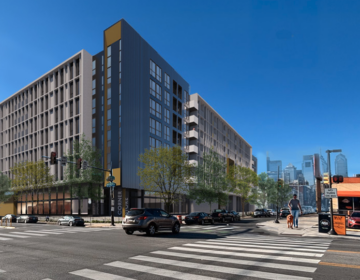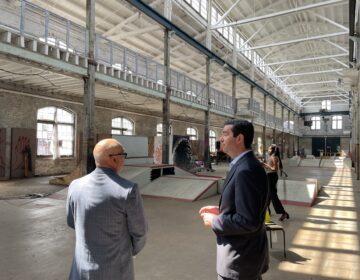Congress activity on transportation, climate change, green infrastructure
From the June 23 issue of the American Planning Association Advocate:
House Committee Introduces Transportation Authorization Bill
OBAMA ADMINISTRATION PROPOSES 18-MONTH EXTENSION
With SAFETEA-LU set to expire in September, Congress has been working on assembling a new authorization bill that sets new priorities for sustainability and reform. Last week the House Transportation and Infrastructure Committee released a blueprint proposal for authorization. The full text of the bill is expected to be introduced this week.
The House action came just a day after the Obama administration proposed an 18-month extension. Transportation Secretary Ray LaHood urged Congress to adopt the extension to stabilize the transportation trust fund, which is due to run out of funding in August, and make additional time to consider key reforms. LaHood proposed some immediate reforms as part of the extension. The reaction on Capitol Hill was mixed, with House Transportation Committee leadership vowing to move ahead with a full reauthorization bill, while key Senators appeared open to the extension.
The blueprint proposal released by House Transportation and Infrastructure Committee Chairman James Oberstar (D-Minn.) did not address the thorny issue of funding. That question will be left to the House Ways and Means Committee, which is likely to spend much of its energy this summer on health care reform. Oberstar has said there will be no extensions of SAFETEA-LU, but Congress faces a heavy workload this summer. Major legislation on energy and climate change is already moving through both chambers, and a proposal for a sweeping overhaul of the healthcare system is expected. Several hearings are scheduled for the coming months, but it is uncertain whether the legislation could be reviewed and amended before the September 30 deadline.
The Department of Transportation is already taking steps to further the administration’s transportation goals, releasing guidance last month for TIGER Discretionary Grants. The new grant program is focused on transportation infrastructure investment, including projects with New Start and Small Start funding.
Climate Bill Clears Biggest Hurdles Before Floor Action
AG COMMITTEE REMAINS ON FENCE; VOTE POSSIBLE THIS WEEK
The American Clean Energy and Security Act of 2009 was passed out of the House Energy and Commerce Committee last month, and House leaders have been working steadily to secure support and move the measure to the Senate. The bill is a comprehensive cap-and-trade program aimed at reducing greenhouse gas emissions. A number of key planning-related provisions are part of the package. Portions of the legislation were referred to eight other House committees, but in the face of possible weeks of deliberations and stalls, all but one committee has agreed to bypass consideration.
Rep. Colin Peterson (D-Minn.), chairman of the House Agriculture Committee, is the only holdout to bypassing the bill, citing concerns that farm communities would be hurt by rising fuel and electricity prices. After holding a hearing last week on the legislation, Rep. Peterson has been meeting with the bill’s drafters, Reps. Henry Waxman (D-Calif.) and Edward Markey (D-Mass.), along with House leadership to negotiate an agreement. Waxman says he is optimistic that negotiations will result in a compromise and win the votes of other rural Democrats, and that the bill will pass in a floor vote. However, because of delays on other legislation currently on the House floor, a vote may be delayed until after the week-long July 4 recess.
The current version of the bill includes language on the effects of the transportation sector and its role in reducing greenhouse gas emissions through grants to states and metropolitan planning organizations that would improve data collection and modeling, develop comprehensive plans, and implement completed plans. Other provisions include a section on adaptation to climate change, which directs funds to support a National Climate Change Vulnerability Assessment. This would include regional activities, a National Climate Change Adaptation Fund to help localities with the cost of adaptation, and the creation of a National Climate Service to facilitate data collection and provide technical assistance. The bill did not include a specific funding mechanism for planning, but negotiations on revisions prior to a floor vote may lead to funding.
Sustainability Hearing in Senate Lays Out Principles
EPA ADDED TO AGENCY COLLABORATION
The Senate Banking Committee, led by Chairman Chris Dodd (D-Conn.), held a hearing last week on the expanded agency partnership among Housing and Urban Development (HUD), U.S. Environmental Protection Agency (EPA), and Department of Transportation (DOT) designed to promote community sustainability by linking federal housing, transportation, and environmental programs and regulations.
HUD and DOT Secretaries Shaun Donovan and Ray LaHood appeared with EPA Administrator Lisa Jackson to discuss the partnership effort. The agencies have adopted a list of six principles of livable communities that will guide and inform the interagency partnership and forthcoming regulations and programs. The principles are: increased transportation choices; increased equitable, affordable housing opportunities; increased economic competitiveness; support for existing communities; leveraging of federal investment; and value of communities and neighborhoods.
The new testimony expands on comments made by HUD and DOT earlier in the year. In the HUD FY 2010 budget proposal, a new “sustainable communities initiative” called for $150 million in funding for community grants, challenge grants, and research. In their testimony, Donovan, LaHood, and Jackson called the sustainability initiative and the interagency partnership top priorities. In the hearing, Chairman Dodd, recent winner of the APA Legislator of the Year Award, affirmed his support for increased federal funding to support better coordinated regional and local planning and suggested that the committee was preparing to release new regional planning legislation.
Green Communities Act, National Infrastructure Bank Bills Introduced
GREEN INFRASTRUCTURE INITIATIVES GAINING MOMENTUM
Two bills introduced in the House last week would promote the creation of green infrastructure projects. The Green Communities Act, put forth by Rep. Allyson Schwartz (D-Pa.), is intended to assist cities in planning, designing, and implementing green infrastructure strategies. Through a new initiative at the Department of Commerce’s Economic Development Administration, the government will encourage public-private partnership by contracting with five nationally recognized nonprofit organizations and providing technical assistance to 80 municipalities across the U.S.
The second bill, introduced by Rep. Rosa DeLauro (D-Conn.), outlines a plan to create a National Infrastructure Bank. The bank would finance improvements in transportation and telecommunications and in energy investment through a combination of federal funding and private investment. DeLauro says it is a way to create jobs and spur economic growth.
GREEN Act of 2009 Expands Scope, Gains Traction
HOUSING PROVISIONS SUPPORT ENERGY EFFICIENCY AT HUD
The Green Resources for Energy Efficient Neighborhoods (GREEN) Act of 2009, introduced this month by Rep. Ed Perlmutter (D-Colo.), is a revised version of legislation he introduced last year. The bill includes provisions to create location-efficient mortgage incentives and increased energy efficiency at Housing and Urban Development, along with other energy-saving measures. The House Committee on Financial Services, Housing and Community Opportunity Subcommittee, chaired by Rep. Maxine Waters (D-Calif.) held a hearing this week on the bill with testimony from HUD Deputy Secretary Ron Sims. A companion bill is likely to be introduced in the Senate in the near future.
WHYY is your source for fact-based, in-depth journalism and information. As a nonprofit organization, we rely on financial support from readers like you. Please give today.






